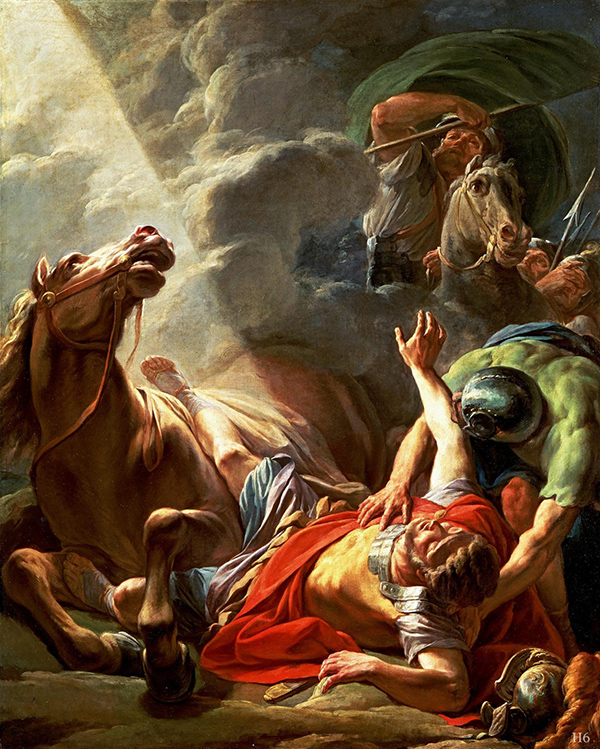Last Monday, the Church celebrated the Feast of the Conversion of St. Paul (Saul of Tarsus). It certainly ranks as one of the most dramatic stories in the Bible, with a 180 degree turn from a man who was literally ordering Christians to be dragged to their death to the man who, together with St. Peter, would become one of the greatest apostles of Christ’s Church, devoting the rest of his life before his martyrdom by beheading to make sure that all of the nations could be baptized and come to know Jesus Christ personally. (See Acts 9 and 22).
St. Paul let absolutely no obstacle stand in his way, and endured flogging, ridicule, shipwreck, hunger and countless other difficulties, but nothing would stop him from his mission. “Woe to me if I don’t preach the Gospel” he famously said (I Cor9:16).
His story is important for our faith life on many levels. First, the faith did not spread across the globe on its own: Our Lord used real men, who sacrificed their lives to make it happen. They were inspired by the Holy Spirit but still, they had to make the decision to pay any price to live and preach the Gospel. That is a powerful reminder to us, that we must never get complacent in our life of faith. We have a (false) tendency to think that it will be easy, painless and always comforting to pursue our faith and discipleship. We certainly don’t learn that lesson from St. Paul!
Another fascinating aspect of St. Paul’s story are the words he hears from Our Lord at the very moment of His dramatic conversion, as he is blinded by the light and truth and presence of Christ: “Saul, Saul, why do you persecute Me?” Our Lord does not say, “Why do you persecute My people?” but “why do you persecute Me?” He is revealing the beautiful yet mysterious doctrine that all those who are baptized into Christ share in His mystical body. (St. Paul elucidates this mystery beautifully in his epistles). We certainly need to remember this when we mistreat the poor, the elderly, the handicapped, the suffering, and the unborn child in the womb. When we show contempt or neglect to the least of Christ’s little ones, we do so to Him. Our Lord says this very directly in Matthew 25.
Perhaps one of the most fascinating aspects of the story of St. Paul is that, before he saw the light of the Lord’s truth, he was absolutely convinced that he was doing good in his quest to purify the Jewish faith by destroying “the Way” – those he later would recognize as brothers and sisters in Christ but originally thought were dangerous traitors to his faith. We should remember this when we are dealing with those who engage in grave evil. It is often the case that they are misguided, and very sincere in their beliefs, as wrongheaded as they are. For example, there are many people who work for Planned Parenthood who genuinely believe they are doing good, advancing the freedom of women, and so on. (Read Abby Johnson’s story in her book, Unplanned. Her conversion from abortion facility director to avid pro-lifer is just such a story.) Rather than demonize people – even if they are in the grip of terrible evil – we have to pray for their conversion and seek the Lord’s wisdom in finding ways that will bring them to the light of Christ’s truth, especially our fellow Catholics who have turned away from that Truth. This applies whether we are talking about our family members, our neighbors, our coworkers, or the President of the United States, who has so sadly turned against his baptismal faith and toward the persecution of the unborn. I recommend praying for his conversion back to the faith through the intercession of St. Paul.
Finally, the story of St. Paul’s conversion reminds us that, by God’s grace, all things are possible, so we should never give up hope of conversion, no matter how deeply someone seems to be entrenched in error and evil.
We are celebrating this Tuesday the Feast of the Presentation of Our Lord (traditionally called Candlemas). In the old calendar, this was considered the end of the Christmas season. That makes sense, because it celebrates one of the mysteries of Our Lord’s infancy: the dramatic moment when holy old prophet Simeon, whom the Lord promised would see the Redeemer of the world before his death, recognizes that Savior in the Divine Child Jesus, Whom His parents offer to God in the temple. He proclaims to the Blessed Virgin and St. Joseph that he can die happy and at peace, because with his own eyes, he has seen the Lord’s salvation, the glory of God’s chosen people, and the light of the revelation of the love of God the Father to all the nations. (See Luke 2:22-40).
From those immortal words comes the ancient tradition of blessing the symbols of the Light of Christ – the candles we use at the altar for the holy sacrifice of the Mass and for other prayers and sacraments. This is traditionally celebrated with a blessing and procession of candles. At the St. Mary’s Mass that day, we will be having a Covid-modified candle procession. If you would like your home devotion candles blessed, please make sure to bring them to the office at St. Mary’s by Monday afternoon or bring them to Mass with you.
